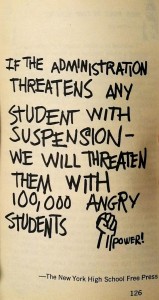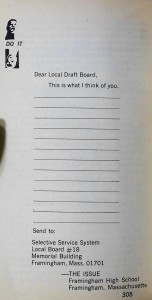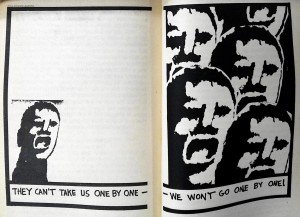This post is part of an ongoing series featuring items recently cataloged from the Julio Mario Santo Domingo Collection.
At the height of the Vietnam War, a time often remembered for the vigorous anti-war protests from young adults, particularly college students, Diane Divoky edited an anthology collection of pieces from underground high school newspapers from across the United States. From a time that holds the Kent State shootings as the result of young people striving to have their voices heard, to find a just society and avoid being forced into war, How Old Will You Be in 1984? pulls out the voices of those young people, collecting them into a barrage of protest.
Underground newspapers were neither new nor rare in 1969, as the counterculture movement depended upon the circulation of radical ideas to remain buoyant. Most often, high school teenagers were not the source of these papers. Yet in this text, Divoky unearthed a collection of newspapers functioning outside of the structure of the education system. Within them, high school students were able to analyze and antagonize the systems they found oppressive—whether it be their parents, teachers, school administrators, the police, or the federal government. They questioned the very systems intended to keep them safe, the war being fought for their future, and whether the hysteria around drug use and hippies was really worthwhile.
Divoky notes in her introduction that the student voices found in these papers varied greatly from the ones found in school administered newspapers and assignments. Here, teenagers were able to speak freely and with the overwhelming emotion that comes with adolescence: “Gut reactions, awareness, vibrations are the surest signs of reality in a world where rhetoric is phony, and ‘reason’ and ‘common sense’ become the weapons of the defenders of the status quo.”
Whether they discussed hair length and dress codes, or the desegregation of their schools and the prospects of being drafted, student voices in How Old Will You Be in 1984? speak to a very particular moment in time.
To learn more, How Old Will You Be in 1984?: Expressions of Student Outrage From the High School Free Press can be found in Widener’s collection: New York: Discus Books, 1969.
Thanks to Irina Rogova, Santo Domingo Library Assistant, for contributing this post.





